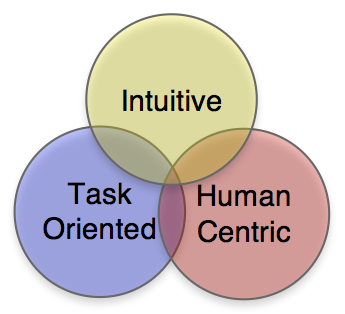We define a People Oriented Programming language as one which is:
- Intuitive (readable, writable, and capable)
- Task Oriented (very high level)
- Human Centric (aligned with human thinking)

A language such as SenseTalk which focuses on and excels at all three of these goals will achieve a sweet spot in the center which enables ordinary people to accomplish common tasks using familiar terms, with minimal special training.
People Oriented Programming (POP) is a language design philosophy that clearly emphasizes the needs of people over those of the machine. Human understanding and ease of use for accomplishing common tasks are of paramount importance. Naturally, the main focus is on making the language itself familiar and accessible. But the philosophy also extends beyond the language syntax, to include modes of functioning that fit with human perception and understanding. For example, the qualities of Flexibility, Contextual Richness, and Fluidity focus on making the language conform to human expectations.
While the three core goals overlap one another, and may be hard to quantify in absolute terms, a People Oriented Programming language should strive to excel in all three areas. At a minimum, a POP language should be easy for an untrained person to read and understand. Ideally, it should also be easy to write once a few basic concepts are understood. People Oriented Programming is all about making scripting accessible by providing a language that works in a way that is closer to the way people think and work.
Qualities of an Intuitive language:
Qualities of a Task Oriented language:
- "What" not "How" (Very High Level)
- Contextual
- Deep
Qualities of a Human Centric language:
- Natural (English-like)
- Flexible
- Fluid
- Consistent
[SenseTalk™ and Eggplant™ are trademarks of Eggplant Software]